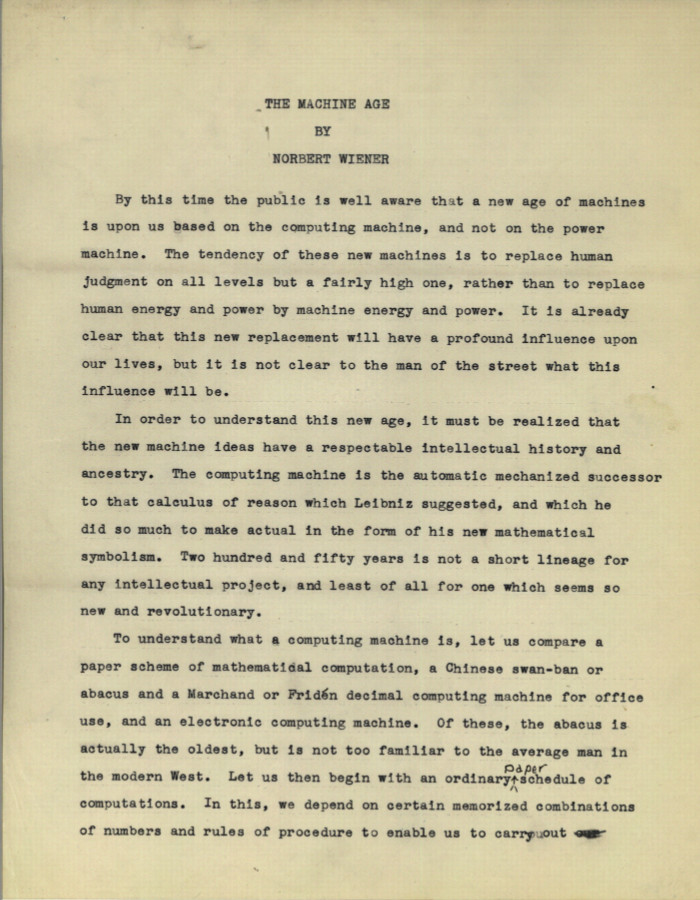Norbert Wiener: The Machine Age (1949)
Filed under paper | Tags: · computing, machine, mathematics

In 1949, The New York Times invited MIT mathematician Wiener to summarize his views about ‘what the ultimate machine age is likely to be,’ in the words of its longtime Sunday editor, Lester Markel. Wiener accepted the invitation and wrote a draft of the article; but Markel was dissatisfied and asked him to rewrite it. Wiener did. But things fell through the cracks and his article was never published.
It languished in the MIT Libraries’ Archives and Special Collections until December 2012, when it was discovered by Anders Fernstedt, an independent scholar who is researching the work of Karl Popper. Almost 64 years after Wiener wrote it, his essay is still remarkably topical, raising questions about the impact of smart machines on society and of automation on human labor. (from The New York Times)
Previously unpublished
Written in 1949, Manuscript Version 3
Creative Commons Attribution-NonCommercial license
8 pages
commentary (The New York Times, May 2013)
commentary (Angela Mitropoulos, September 2013)
Guide to the Papers of Norbert Wiener (MIT Libraries)
PDF (no OCR)
PDF (no OCR, Alt link)
Arno van der Hoeven: The Popular Music Heritage of the Dutch Pirates (2012)
Filed under paper | Tags: · 1960s, 1970s, 1980s, cultural heritage, diy, music, netherlands, pirate radio, popular music, radio
“This article explores how cultural identities are negotiated in relation to the heritage of illegal radio in the Netherlands. The term ‘pirate radio’ commonly refers to the offshore radio stations that were broadcasting during the 1960s. These stations introduced commercial radio and popular music genres like beat music, which were not played by public broadcasters at the time. In their wake, land-based pirates began broadcasting for local audiences. This study examines the identities that are constituted by the narrative of pirate radio. Drawing on in-depth interviews with archivists, fans and broadcasters, this article explores the connection between pirate radio, popular music heritage and cultural identity. Moreover, it considers how new technologies such as internet radio provide platforms to engage with this heritage and thus to maintain these local identities. To examine how the memories of pirate radio live on in the present a narrative approach to identity will be used.” (Abstract)
Published in Media, Culture & Society journal, 34(8), pp 927-943
14 pages
Viktor Tausk: On the Origin of the “Influencing Machine” in Schizophrenia (1919/1933)
Filed under paper | Tags: · influencing machine, machine, psychiatry, psychoanalysis, schizophrenia

“On the Origin of the ‘Influencing Machine’ in Schizophrenia is a highly influential article written by psychoanalyst Viktor Tausk.
The paper describes Tausk’s observations and psychoanalytic interpretation of a type of paranoid delusion that occurs in patients diagnosed with schizophrenia. The delusion often involves their being influenced by a ‘diabolical machine’, just outside the technical understanding of the victim, that influences them from afar. It was typically believed to be operated by a group of people who were persecuting the individual, whom Tausk suggested were “to the best of my knowledge, almost exclusively of the male sex” and the persecutors, “predominantly physicians by whom the patient has been treated”.
These delusions are known in contemporary psychiatry as ‘passivity delusions’ or ‘passivity phenomena’ and are listed among Kurt Schneider’s ‘first rank’ symptoms which are thought to be particularly diagnostic of schizophrenia, and still form some of the core diagnostic criteria.” (from Wikipedia)
Originally published in the journal Internationale Zeitschrift für Psychoanalyse, 1919.
Translated from German by Dorian Feigenbaum
Published in Psychoanalytic Quarterly, 2, 1933, pp 519-556
Republished in Journal of Psychotherapy Practice and Research, Vol 1, No 2, Spring 1992, pp 184-206
Image courtesy Zoe Beloff
artwork by Zoe Beloff inspired by the case (2001)
animated video by Brooke Gladstone and Benjamin Arthur explaining the case (2011)
article by Christopher Turner (Cabinet, 2004)

